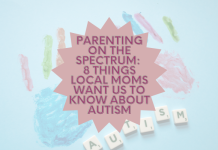As a former classroom teacher and reading specialist, I have had the pleasure to work with a variety of students and what a joy it has been to witness their growth and progress.
In my professional experience I have found that students with dyslexia are the most imaginative and adaptable kids. They are empathetic, quick thinkers, bright, creative, great problem solvers, and are extremely observant.
They have excellent listening comprehension and can figure things out quickly. Helping students with dyslexia to focus on their strengths, and use those strengths to their advantage, can help them feel successful inside and outside of the classroom.
It is also important to catch this diagnosis early on so that necessary interventions can be put in place as soon as possible.
Here’s a few helpful local resources as a former reading specialist myself.
XO,
Barbara
Resources
If you have concerns about your child’s development I encourage you to reach out to their teacher and see what types of interventions can be put in place. You are your child’s best advocate so do not hesitate to reach out for help. In most cases, dyslexia can be diagnosed by a licensed educational psychologist. If your child ends up receiving a dyslexia diagnosis, don’t panic and don’t lose hope. Remember this diagnosis has nothing to do with intelligence.
I highly encourage you to locate a certified Barton tutor in your area. Children with dyslexia will benefit mostly from a multisensory approach like the Barton program. Intense, research-based, direct and explicit phonics intervention programs can help children with dyslexia make the most gains in reading and feel successful.
Two great local resources here in the East Valley:
- Shaun Aguilar with the Dyslexic Group
- Dyslexia Pros: locations in Mesa and Tempe
If dyslexia is part of your child’s story, please do not be discouraged. Continue to focus and build on your child’s strengths and do not hesitate to reach out for help. Start with your child’s teacher or the reading specialist at their school. There is support available. You never have to walk this journey alone.
Warning Signs
Even before children learn to read there can be early warning signs. Some preschool warning signs include:
- Trouble rhyming, learning nursery rhymes and song lyrics that rhyme
- Struggle to name familiar objects
- Trouble singing the letters of the alphabet
- Struggle to follow and remember multiple step directions
Dyslexia tends to be caught more when children are learning to read. Warning signs in Kindergarten-2nd grade may include:
- Having trouble learning letter names and the sounds they make
- Confusing letters like b and d (if this continues past the end of 1st grade)
- Confusing letters that sound similar
- Having trouble segmenting sounds in a word and blending the word together
- Trouble with spelling
- Trouble reading familiar words
- Substituting words when reading aloud
If a child is in 3rd-5th grade warning signs may include:
- Having trouble reading out loud
- Poor spelling
- Frustrated when reading or avoiding it altogether
- Not meeting the benchmark goal for reading fluency
- Confusing or skipping small words (ex: for or of when reading aloud)
- Trouble sounding out new words
- Trouble with sight words
- Struggling to explain what happens in a story and key details
- Reversing letters b and d
Tweens, teens and adults:
- Reading slowly
- Leaving out small words and parts of longer words when reading aloud
- Struggle to remember common abbreviations
- Searching for words/substituting words
- Not getting jokes or puns
- Taking a long time to complete reading assignments
Did you know dyslexia often runs in families? If a parent or older sibling has a diagnosis, that is something to be aware of.










